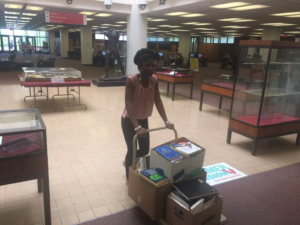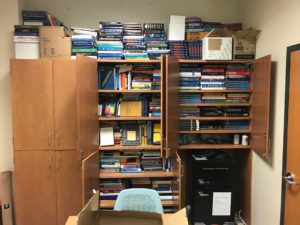For Immediate Release (June 5, 2017)
A brand-new nonprofit organization initiated by a Southern Illinois University Edwardsville (SIUE) graduate student and a native of Nigeria is filling shelves in African universities with much-needed textbooks donated by faculty and students around the world.
Efiwe, Nigerian Pidgin for “bookworm,” is the charitable organization founded here in Edwardsville with a growing presence at book-drive locations on campuses across the United States. SIUE graduate student Philip Alabi’s fervor for equipping West African post-secondary students with badly-needed textbooks and related resources is resulting in the formation of a 501(c)(3) and two boards of directors, one in Edwardsville and one in Nigeria.
 When Àlàbí first arrived in the U.S. two years ago to begin his master’s of science degree in chemistry at SIUE, he saw first-hand how relatively affordable university-level textbooks are to acquire in the U.S. compared to Nigeria. He also saw stacks of still-relevant textbooks in good condition that were being discarded.
When Àlàbí first arrived in the U.S. two years ago to begin his master’s of science degree in chemistry at SIUE, he saw first-hand how relatively affordable university-level textbooks are to acquire in the U.S. compared to Nigeria. He also saw stacks of still-relevant textbooks in good condition that were being discarded.
“Even for university instructors, textbooks and relevant resource materials are extremely expensive and difficult to come by in West Africa,” Àlàbí said. “In the U.S., there’s the university bookstore, online academic resources and online vendors such as Amazon.com through which students can access the latest versions of textbooks required for their university courses. Sadly this is not the situation in Nigeria, even at the university level. Hard-copy books for courses are typically outdated and there are not enough to go around. If they are attainable, it is generally only the instructors who have a copy of the text, not the students.”
Adding to the challenges, Nigeria’s sporadic power supply and expensive Internet access makes it nearly impossible for university faculty and students in West Africa to access and download online academic resources, according to Àlàbí. “Our aim through Efiwe is to collect relevant textbooks across U.S. colleges and universities and send the books to university and community college libraries in Western Africa,” he said. “Our organizational mission is to send more than one million textbooks to African universities by the year 2030.”
The mission is ambitious, but Efiwe and its boards of directors, inspired by Àlàbí’s passion, are well on their way. In Spring of 2017, before Efiwe was formally conceived, Alabi and fellow SIUE colleagues launched an on-campus book drive with the same purpose. The results were astounding.
 “We thought maybe we’d receive a couple hundred donated textbooks at our initial book drop-off sites on campus at SIUE,” said Àlàbí, who will pursue a doctoral degree in chemistry from Brown University in August. “That initial donation topped 1,000 textbooks in only a few months. We also raised funds to pay for the cost of transporting the books by ship to my home university, Tai Solarin University of Education in Nigeria. We are absolutely confident that we can continue the momentum and tap into the generosity of teachers and learners in the U.S.”
“We thought maybe we’d receive a couple hundred donated textbooks at our initial book drop-off sites on campus at SIUE,” said Àlàbí, who will pursue a doctoral degree in chemistry from Brown University in August. “That initial donation topped 1,000 textbooks in only a few months. We also raised funds to pay for the cost of transporting the books by ship to my home university, Tai Solarin University of Education in Nigeria. We are absolutely confident that we can continue the momentum and tap into the generosity of teachers and learners in the U.S.”
Tai Solarin Deputy University Librarian Jasiliu Kadiri said the donated textbooks would add value to teaching, learning and research work at the university. “We acknowledge with profound thanks the receipt of these volumes of books covering various fields including general and pure sciences, education, social sciences and children’s books,” Kadiri said.
Right now Efiwe is identifying university and community college campuses that are willing to establish a textbook drop-off site on their campuses. Efiwe is also seeking students who will operate and champion book drive initiatives in their respective universities and colleges, Alabi said. Ultimately Efiwe will ask for financial support to pay for the transportation of the books by ship from the U.S. to Nigeria and other West Africa destinations. But for now, the biggest and best way supporters can assist the nonprofit organization is by donating new or gently used textbooks on any and all academic subjects.
 “We encourage individuals and student associations at community colleges, technical colleges and universities across the Midwestern states who are willing to designate a location on their campus as an Efiwe textbook drop-off site,” Àlàbí said.
“We encourage individuals and student associations at community colleges, technical colleges and universities across the Midwestern states who are willing to designate a location on their campus as an Efiwe textbook drop-off site,” Àlàbí said.
Web developers are currently working to create an online book inventory of all the texts and supporting materials that are being donated so recipient universities can order the volumes they need.
For more information on Efiwe, go to Efiwe.org or email info@efiwe.org.
No Comments to SIUE Grad Student Launches International Nonprofit Org to Fill West African University Shelves with Textbooks so far. (RSS Feeds for comments in this post)
No one has commented so far, be the first one to comment!